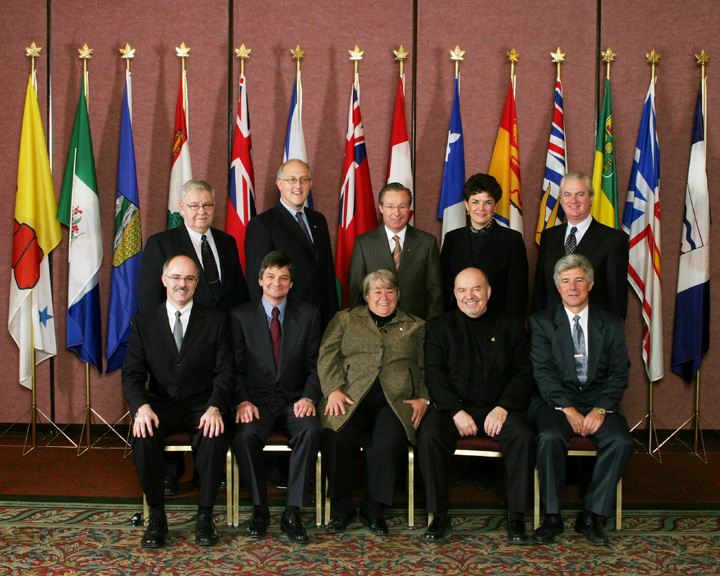
Federal-Provincial-Territorial Meeting of Ministers responsible for Labour
NEWS RELEASE – Labour Ministers Meet in Banff, Alberta

BANFF, ALBERTA — The Honourable Claudette Bradshaw, Federal Minister of Labour and Minister responsible for Homelessness, and the Honourable Clint Dunford, Minister of Alberta Human Resources and Employment, co-chaired a meeting of federal, provincial and territorial ministers responsible for labour today in Banff, Alberta. The meeting focused on occupational health and safety, and international trade and labour issues.
“I am delighted with the steps we have taken today regarding provincial and territorial participation in the negotiation of international labour cooperation agreements,” said Minister Bradshaw. “Our labour cooperation agreements demonstrate Canada’s commitment to fundamental human rights and an international development strategy based on equitable economic growth, good governance and the rule of law.”
The ministers of labour have reviewed an approach to provincial and territorial participation in Canada’s labour cooperation agreements. These are side agreements to free trade agreements that require Canada and its trading partners to provide protection for fundamental labour principles. The new approach is an important step in enabling provincial and territorial involvement in the negotiation and implementation of international labour cooperation agreements. They have also instructed the Canadian Association of Administrators of Labour Legislation to develop a draft of an intergovernmental agreement that will describe how provinces and territories can participate in managing labour cooperation agreements, and in handling disputes with our international trade partners. The ministers noted the importance of working with their colleagues within their own jurisdiction to move this agenda forward.
The ministers also discussed the success they have had in their respective jurisdictions in addressing occupational health and safety issues. The ministers of labour recognize the importance of safe and healthy workplaces for both employers and workers, and reaffirmed their commitment to maintaining and enhancing occupational health and safety across Canada.
“Workplace injuries affect workers, employers, and families across Canada,” said Alberta Human Resources and Employment Minister Clint Dunford. “Sharing best practices at a meeting like this will help us continue to promote and ensure safe workplaces.”
The ministers of labour meet every year to share experiences and promote cooperation among labour jurisdictions in Canada. Throughout the year, ongoing work continues through the Canadian Association of Administrators of Labour Legislation.
- 30 -
Fact sheet attached.
For more information:
Scott Naugler
Office of the Minister of Labour
(819) 953-5646
Laurie Collins
Communications
Alberta Human Resources and Employment
(780) 427-5585
FACT SHEET
International Labour Cooperation Agreements
- Through international labour cooperation agreements, Canada promotes improved living standards and working conditions, and workers’ rights abroad. Canada has signed agreements with Mexico, the United States, Chile and Costa Rica.
- These agreements build upon Canada’s commitment to fundamental human rights, in particular the principles and rights set out by the International Labour Organization (ILO) in its Declaration on Fundamental Principles and Rights at Work. These fundamental principles include: freedom of association and collective bargaining, the abolition of forced labour and child labour, and the elimination of discrimination in employment. The Declaration is important not only because of its wide acceptance by both business and labour, but also because it explicitly defines, based on a global consensus, the most fundamental labour rights.
- A key element to improved living and working conditions is the promotion of core labour standards. One of the principal objectives of the agreements is the effective enforcement of labour legislation in all countries.
- Partnership and cooperation are important to the success of these agreements and cooperative activities allow countries to share information and best practices in such areas as industrial relations, occupational health and safety, labour standards, and employment and pay equity.
These agreements also allow Canada t
- Support an international development strategy based on equitable economic growth, good governance, and the rule of law. The rule of law, as well as transparent and effective enforcement of labour legislation, supports business and commercial development and more equitable income distribution.
- Build upon our commitment to fundamental human rights, in particular the principles and rights set out by the ILO in its Declaration on Fundamental Principles and Rights at Work.
- Support a broad-based approach to trade and economic integration that takes into account and promotes the well-being and rights of workers.
- Protect Canada’s economic interests by seeking to ensure that legitimate government policies and actions balance the interests of workers and employers and do not become a disadvantage in competition for international trade and investment.
January 2004